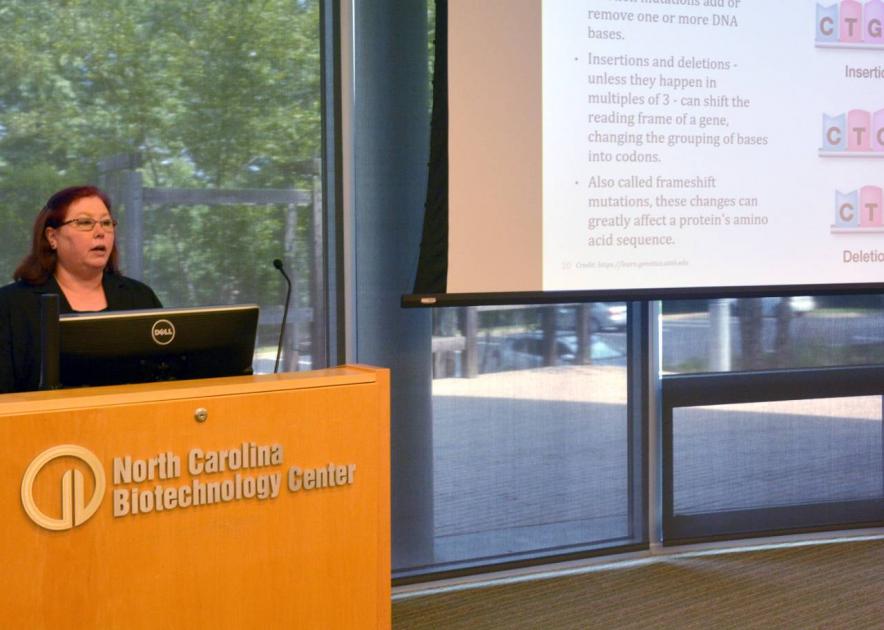
Tracey du Laney Empowers Staff to Become Science Ambassadors to their Communities
As Senior Director of Science & Technology Development at the North Carolina Biotechnology Center, Tracey du Laney helps to bring scientific expertise and companies to North Carolina to drive life sciences research and economic development. As a 2019-20 AAAS Leshner Public Engagement Fellow, one of her goals for creating institutional change to support public engagement with science centered around “Science Club.” She and a colleague started this once-a-month event shortly before her fellowship, to enable staff members who are not scientists but who are intensely curious about science to become more comfortable learning and talking about science informally. “I wanted to help them be ambassadors for our work and the science we enable,” she says.

Lifelong Learning class and for Science Club at NCBiotech.
Over the course of the year, du Laney and her colleague expanded Science Club, establishing a core group who regularly attended, as well as others who joined depending on the topic and timing. The greatest interest came from the finance department, then from corporate communications, the agricultural department (who help farmers stay abreast of new technologies), and economic development team members. The topics varied based on suggestions from staff and ranged from antibiotics to astrophotography. Du Laney noted that a guest speaker from NASA’s public relations department drew quite a crowd. Many times, she facilitated hands-on activities, which were also well-received.
The Science Club held a session in February on the topic of SARS-CoV-2 and COVID-19 (for which du Laney drew heavily from Science Magazine’s resources). They have not met since – as appetites for yet another virtual meeting are low. However, du Laney is planning to collect evaluation data to provide to her institution, since they pay for the lunches provided for Science Club meetings. She is very appreciative that the AAAS fellowship offered her ideas about measuring the impact of her activities.
Before the pandemic hit, du Laney conducted informal one-on-one conversations with her core group of attendees and with some of the less frequent participants. The feedback she received was very positive – as she had hoped, those who felt they had the weakest science background said they “had learned things they brought to their dinner tables and some to their kids’ classrooms. They were feeling more empowered and knowledgeable about science in general, not just the topics we discussed.”
When du Laney returned last summer from her AAAS Leshner Fellows orientation in Washington, DC, she gave a presentation at a staff meeting about the training. As a result, her corporate communications team has become more aware of her as a resource to them, and they sometimes send her articles they’re putting together to get her input. “They now know I have the interest and will always be willing to help them make it clearer and reach the public in a wider sphere,” she says. Another outcome du Laney attributes to the AAAS Leshner fellowship is that it gave her the courage to apply to an internal leadership development program, to which she was accepted.
Through an introduction made by the Corporate Communications department, du Laney was asked to lead an “ethics of gene editing” class for the Osher Lifelong Learning program at nearby North Carolina State University. She adapted the gene editing forum activity she had participated in at the AAAS training, turning it into four sessions, focused on gene editing basics and methods, editing for human therapeutics, animals and plants, and human enhancements. The first session was held in-person and the rest, virtually. Her style of presentation is to facilitate discussions rather than give lectures – yet she found she always had the same few people talking. Many participants didn’t have their webcams on, so she also couldn’t get feedback from their nodding heads -- but she did get good reviews and will likely be doing the course again in the spring.
Du Laney notes that not all her efforts bore fruit – she and a colleague organized numerous meetings to see if there could be a collaboration between her institution and the North Carolina Science Festival, an initiative of Morehead Planetarium and Science Center at the University of North Carolina at Chapel Hill. However, there turned out not to be sufficient overlap in their goals.
She says her thoughts on what’s next for her public engagement are focused in part on the idea of writing an op-ed related to science education and communication -- several of her colleagues in the AAAS cohort have also taken up op-ed writing. “I have gotten so much out of it,” du Laney says of the fellowship. A few of the fellows have been incorporating science communication and public engagement into their teaching, and she has been thinking about how she might do that in her situation. “I loved hearing what others were doing and getting inspired by that.”
The AAAS Leshner Leadership Institute was founded in 2015 and operates through philanthropic gifts in honor of CEO Emeritus Alan I. Leshner. Each year the Institute provides public engagement training and support to 10-15 mid-career scientists from an area of research at the nexus of science and society.
